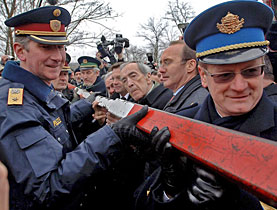Foreign minister pushes bilateral deals with EU

Foreign Minister Micheline Calmy-Rey has called for increased efforts to forge closer bilateral relations with the European Union.
She came out in favour of a framework accord with Brussels to manage the various bilateral treaties concluded over the past few years and called on Swiss voters to accept a labour accord with Romania and Bulgaria.
However, she recognised that some differences remain between the two sides.
“When it comes to politics there can never be agreement on everything between Switzerland and the EU,” Calmy-Rey said according to a text published in Friday’s edition of the Le Temps newspaper.
She warned that if Swiss voters failed to grant workers from Bulgaria and Romania the same rights as those from other EU countries, this would jeopardise ties with the 27-nation bloc.
The agreement on the free movement of labour is to be put to a popular vote, probably in 2009.
“We have to approve the accord on the free movement of people. It is key to economic growth and the creation of jobs in Switzerland,” Calmy-Rey said in her speech in Interlaken.
Her concerns were echoed on Friday by Switzerland’s new ambassador to the EU, Jacques de Watteville. He told journalists in Brussels that if the accord were not extended, this would have “serious consequences” for the Swiss economy.
He named the issue as a priority for the coming months.
EU view
Meanwhile the EU ambassador to Switzerland, Michael Reiterer, spoke about the same subject in an interview published in the Neue Luzerner Zeitung newspaper.
“A no to the labour accord would bring down the first package of bilateral accords and put an end to the policy of bilateral treaties,” he warned.
However, he said he was convinced that it would not get to that stage, since Swiss voters knew what was at stake for the country.
Reiterer added that a payment of an estimated SFr300 million ($272 million) by Switzerland to the two new eastern European member states would help make them more attractive to Swiss businesses.
Tax dispute
Both Calmy-Rey and de Wattville warned against focusing too much on a row between Brussels and Bern over tax breaks offered by some Swiss cantons to foreign companies.
Calmy-Rey said the dispute should not delay negotiations on an accord on electricity and a free trade accord on agricultural products.
For his part, de Watteville said that while the dispute over tax should be taken seriously, people should not look at “just one tree in the whole forest.”
He pointed out that several EU members had previously run into trouble with the EU commission over their tax provisions, but they had found creative solutions which enabled them to remain attractive to investors.
However, the tax issue does not appear likely to go away.
Christoph Blocher of the right wing People’s Party has linked the tax dispute with the labour agreement. He told Swiss television on Friday that if the EU did not withdraw its “indecent” demands for a change to Swiss tax laws his party would call a referendum to oppose the extension of the free movement of workers.
swissinfo with agencies
Switzerland is not a member of the European Union.
The government sees EU membership as a long-term option.
Switzerland is linked to the EU via a series of bilateral accords and the EU is Switzerland’s main trading partner.
In the 1990s debate over Switzerland’s policy towards Europe polarised the national political landscape.
Switzerland has been granting financial aid to countries mainly in eastern Europe to help them transform into market economies.
As part of the second set of bilateral treaties with Brussels, Switzerland pledged to provide SFr1 billion ($0.91 billion) to the ten EU member states which joined the bloc in 2004.
It is also likely to pay about SFr300 million to Bulgaria and Romania.

In compliance with the JTI standards
More: SWI swissinfo.ch certified by the Journalism Trust Initiative











You can find an overview of ongoing debates with our journalists here . Please join us!
If you want to start a conversation about a topic raised in this article or want to report factual errors, email us at english@swissinfo.ch.